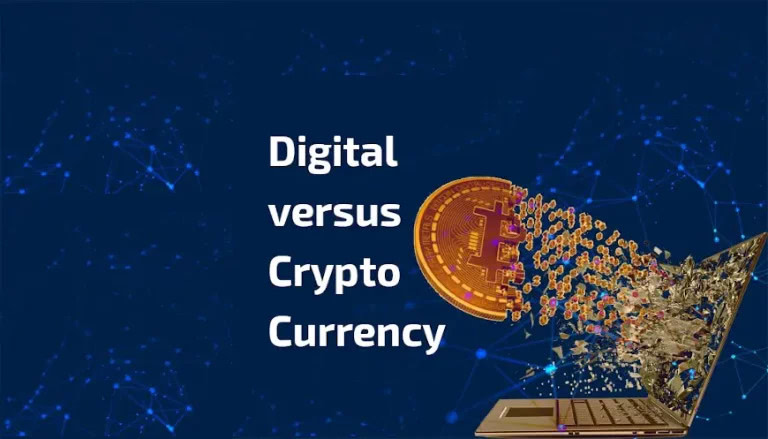
Trying to understand the difference between digital currency and cryptocurrency can be a bit confusing. Some websites make it even more confusing because they use these two terms like they mean the same thing. But they don’t.
Think of it this way: while both digital currencies and cryptocurrencies are kinds of money used online, they aren’t the same. It’s important to know how they’re different, especially if we want to use them safely. This guide will compare digital currency vs. cryptocurrency and how they compare to regular money and other types.
- 1. What is the Difference Between Digital Currency and Cryptocurrency?
- 2. Digital Currency vs. Traditional Currency Differences
- 3. Is there a Difference Between Digital Currency and Virtual Currency?
- 4. Cryptocurrency vs. Digital Currency vs. Traditional Currency Comparison
- 5. Which is Better, Traditional Currency, Cryptocurrency, or Digital Currency? Final Points
- 6. FAQ
What is the Difference Between Digital Currency and Cryptocurrency?
Digital currency vs. cryptocurrency? it may sound like the same thing, but they’re not. If you’re new to this, start cryptocurrency classes. first. After that, we’ll talk about what each of these means and how they’re different.
Digital currency is like online money. Think of it as digital coins and bills. You can use it online, and sometimes you can even turn it into real cash using machines called ATMs. It’s a way to pay for things without using actual paper money or coins.
So what is crypto? Cryptocurrency is a special kind of online cash. It’s protected by something called cryptography, and it’s based on a system known as the blockchain. There’s only a certain amount of digital tokens, and you can use it for more than just shopping. You might’ve heard of some, like Bitcoin or Ethereum. In a way, you can say that cryptocurrency is a type of digital currency. If you want to learn more, check out our blog post titled “Best cryptocurrency to invest in“. And if you’re thinking of investing, we have a list of the best ones to look into.
To sum it up, the main difference between digital currency and cryptocurrency is how they work. Digital currency is like online cash, while cryptocurrency uses a special system called blockchain. There’s more to learn, but this is a good start!
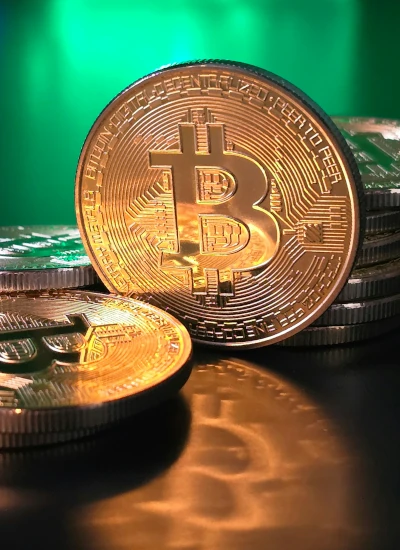
Want to Build Wealth with Cryptocurrency?
Unlock the full potential of crypto investments. We teach you how to:
Manage Crypto Asset – trade, and store digital assets securely.
Minimize Risks – through insights on how to deal with volatility and security risks.
Build Wealth – with customized advice for your individual needs.
BOOK YOUR LIVE SEMINAR NOWLegality – The Bitcoin issue
Many countries have rules for using digital money. For instance, the European Union and the United States have their own sets of rules. However, some countries don’t allow cryptocurrencies. In other places, they’re still deciding how to treat them.
El Salvador is one country that lets people use Bitcoin like regular money. Some big international groups have said this might not be a good idea. Still, other countries like Paraguay, Venezuela, and Anguilla might start using it too. The Wall Street Journal says it’s like a battle between younger, daring money folks and the older, traditional ones in New York.
It’s important to note that there are differences if we compare digital currency vs. cryptocurrency. They’re both also different from the money we use daily. We’ll look into these differences next.
Digital Currency vs. Traditional Currency Differences
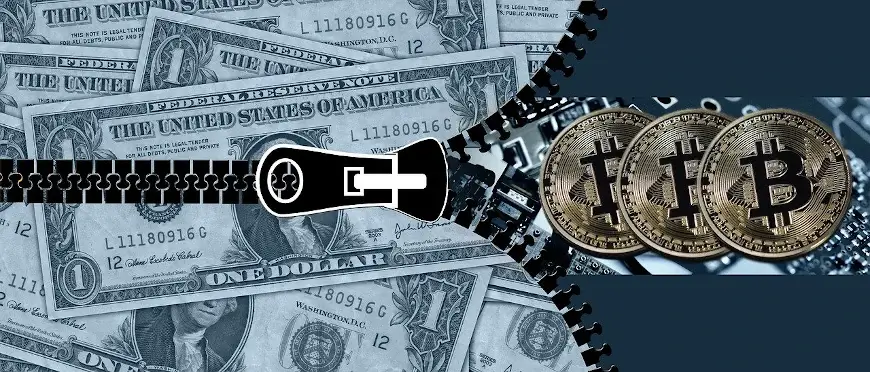
First, let’s compare digital currency vs. traditional currency. Like the U.S. Dollar or Euro, they are called fiat currency. This means it’s official money made by a government. You can have this money in two ways: as paper bills and coins, or on computers like in a bank account. When it’s on a computer, some people call it a digital currency. The United States derives significant economic and national security benefits from the central role that the United States dollar and United States financial institutions and markets play in the global financial system.
Even though we can print more of this money, there’s a downside. Over time, things get more expensive, and our money buys less. This is called inflation. Also, if you have the physical bills and coins, they can be stolen or lost. Some people use this kind of money in bad ways too, like hiding where it came from.
Differences in Digital Currency
Here are the 4 main differences:
1. Scalability
People are using cryptocurrencies like Bitcoin more every day. But, most people still use regular payment systems. Also, the way cryptocurrencies move money can sometimes be slow. This is because they use a system called “blockchain” to record all the transactions. Each group of transactions is put into a “block”. There’s a limit to how many transactions can fit in each block. Right now, it takes about 10 minutes to make a block, and it can’t be bigger than 1 megabyte. The blockchain, which forms part of a distributed ledger, provides a record of every Bitcoin transaction that has ever occurred.
Some ideas have been shared to help fix this problem. They include things like “lightning networks”, “sharding”, and “staking”.
Both Bitcoin and another cryptocurrency called Ethereum want to make sure that all their transactions are safe and that no one central group is in charge of them. But, as more people use them, it gets harder to keep track of everything. Right now, for small payments like buying things in apps, it’s hard to use Bitcoin.
This problem comes from the way Bitcoin checks and records transactions. Everyone in the network has to agree on the transactions. If more people use Bitcoin, there will be more blocks, and it will take longer to check everything.
One idea to fix this is to make the blocks bigger so they can hold more transactions. But, if the blocks get too big, only a few powerful people, called “Bitcoin Miners”, will be able to manage them. This means that fewer people will have control over Bitcoin, which goes against its original idea. However, the increasing popularity of Bitcoin mining has raised concerns about its contribution to climate change and the allocation of resources. Furthermore, the vast amounts of electricity used in the mining of cryptocurrency raise concerns about the allocation of resources and environmental consequences of these payment systems.
2. Cybersecurity issues
Cryptocurrencies are safer than old ways of paying, but they can still be hacked. To keep them safe, we need to always improve our computer security.
3. Price volatility and lack of inherent value
Some people say that cryptocurrencies, like Bitcoin, don’t have a real value. This is why their prices, including the price of Bitcoin, can change a lot. If there’s bad news, the prices might drop quickly. Also, if one person has a lot of cryptocurrency, or if there are security issues or big losses, it can make the prices change fast. One way to fix this might be to connect the value of the cryptocurrency to real things, like gold or property. However, the large fluctuations in the price of many cryptocurrencies, including the price of Bitcoin, mean that their purchasing power is not maintained over time, reducing their effectiveness as a store of value.
4. Regulations
Countries see cryptocurrencies as a problem for various reasons. When governments think cryptocurrencies can hurt their economy, they will make rules that can slow down the growth of these digital coins.
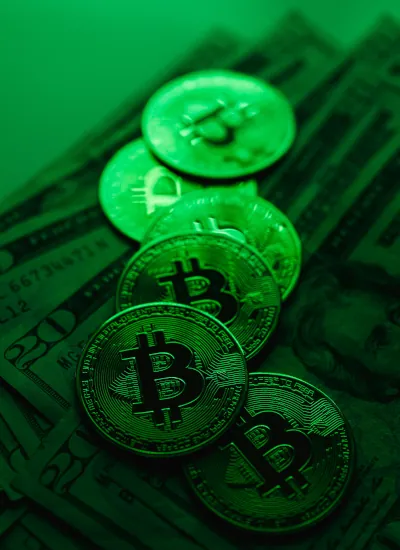
Unlock Your Crypto Potential: Become a Market Maverick with Expert Coaching!
Are you ready to dive into cryptocurrency but need some advice? With our personalized 1:1 coaching, you’ll learn to:
Understand – the fundamentals of cryptos and how they impact value.
Navigate – through the volatile crypto market with confidence.
Identify – new lucrative opportunities that maximize returns.
Manage – exchanges and risk to protect your investments.
BOOK EXPERT COACHING NOWDifferences in Traditional Currency
Here now the 3 main differences for traditional money.
1. Control
Money in a bank belongs to the person who put it there, but the bank can still keep an eye on it. If the bank thinks something wrong is happening, they can stop the person from using their money.
2. Transaction fees
The transaction fee is the cost a company pays when a customer uses a card or online payment. Some middlemen increase these fees, especially with regular money. With online currency, like cryptocurrencies, the usual fee is 0.1% to 1%.
3. Vulnerability
OOver time, regular money can lose its worth. When you have paper money, it can be stolen, lost, or even ruined. If that happens, it’s hard or sometimes impossible to get it back.
Is there a Difference Between Digital Currency and Virtual Currency?
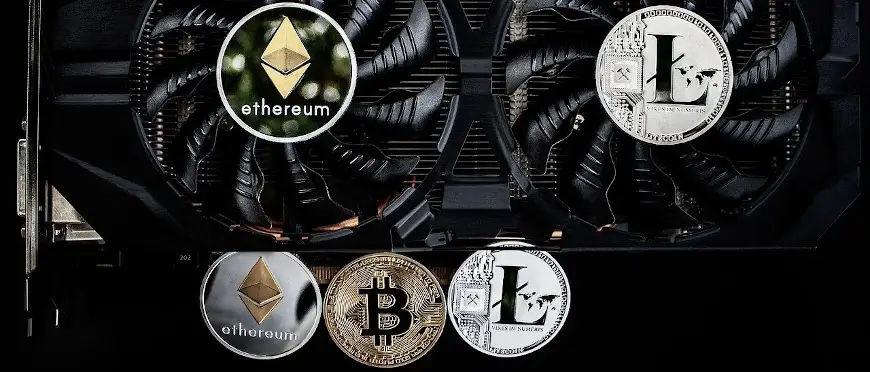
In 2012, the European Central Bank said that virtual currency is like online money made and controlled by certain groups. In 2013, the US Department of Treasury said it’s a way to pay for things online, but it’s not exactly like real money.
Think of online money as a big umbrella. Under that umbrella, there are types like virtual and cryptocurrencies. The digital one includes more than just virtual currency. It’s like having a big family with many members.
Sometimes, online money follows rules set by a country’s main bank. This is like the online version of the money we use every day. But if it doesn’t follow these rules, then it’s called virtual currency. Instead of being made by a big bank, it’s made by private groups. It can be organized in different ways and can have security features or not. The digital one is denominated in the national unit of account, which means it represents a specific value in the country’s money.
Some people worry about virtual currencies because they aren’t controlled by rules. A report from 2015 said that bad guys, like terrorists, might use them for their activities. But anyway, let’s now compare cryptocurrency vs. digital currency and traditional money.
Cryptocurrency vs. Digital Currency vs. Traditional Currency Comparison
| Comparison | Digital currency | Cryptocurrency | Virtual Currency | Traditional fiat currency | Winner/Best solution |
|---|---|---|---|---|---|
| Authority | Centralized | No authority | Centralized | Centralized | Cryptocurrency |
| Structure | Centralized | Decentralized | Both | Centralized | Virtual Currency |
| Encryption | Not encrypted | Highly encrypted | Partly encrypted | Not encrypted | Cryptocurrency |
| Transparency | Transparent | Very transparent | Transparent | Not transparent | Cryptocurrency |
| Anonymity | Low | High | Medium | None | Cryptocurrency |
| Security | Secure | Secure | Secure | Less secure | Cryptocurrency |
| Regulation | Both | Regulated | Unregulated | Regulated | Digital Currency |
| Transaction fees | Minimal | Minimal | Minimal | High | Cryptocurrency |
| Manipulation | Medium risk | Low risk | Medium risk | High risk | Cryptocurrency |
| Issuance | Government | Communities | Individual | Government | Virtual Currency |
| Legal aspect | Defined | Not defined | Defined | Defined | Digital Currency |
| Value | Fixed | Oscillating | Semi-fixed | Fixed | Digital Currency |
1. Authority for Digital Currency and Cryptocurrency
Most of the time, a country’s main bank supports online money and is increasingly interested in issuing its own financial services, including its own new types of online currencies. Some countries are making a special kind of online currency that uses a special technology. This main bank can watch all the money being spent and can stop accounts if they think someone’s doing something wrong. This is different from cryptocurrencies, like Bitcoin. With cryptocurrencies, no single group controls it.
Winner: Traditional Fiat currency
2. Digital Currency and Cryptocurrency difference in Structure
Let’s talk about the digital currency and cryptocurrency difference first. Digital currencies are like coins controlled by one big group, like a government. Cryptocurrencies, on the other hand, aren’t controlled by just one group. Instead, they’re spread out and managed by many computers working together.
For instance, China stopped using cryptocurrencies and decided to make its own online money. This new money is controlled by their government, which is like the one big group. But with cryptocurrencies, many computers record and check transactions, and no single group is in charge. This lets users deal directly with each other, while law enforcement and intelligence agencies have learned to leverage the traceability of most cryptocurrencies by using blockchains to analyze and track criminal activity.
Winner: Cryptocurrency
3. Encryption of Digital Currency vs. Cryptocurrency
If we look at digital currency vs. cryptocurrency then there is a huge difference in encryption methods. Think of digital currency as online money. Now, think of cryptocurrency as a special kind of online money that’s locked with a secret code. While normal online cash can sometimes be stolen by hackers, cryptocurrency has an extra layer of protection because of its secret code. This makes it harder for bad guys to take.
Winner: Cryptocurrency
4. Digital Currency vs. Cryptocurrency Transparency
Transparency is the biggest difference if we compare digital currency vs. cryptocurrency. When you use a credit card online, people can see that a purchase happened. But with digital coins called cryptocurrencies, it’s even more open. They use something called a blockchain, which gives each user a special address. This means anyone can look and see what you bought or how much you have. It’s a new way of being super open, and it’s only with these digital coins. In addition, the current fascination with cryptocurrencies has potentially added to the speculative nature of these markets and has raised concerns about consumer protection.
Winner: Cryptocurrency
5. Anonymity when using Digital Currency or Cryptocurrency
Most online money accounts ask you to show who you are. Usually, you’ll need to give a picture of your passport and maybe some other papers, based on where you live. Cryptocurrencies, like Bitcoin, are different. Even though people can see the money moving, they don’t know who is sending or receiving it. You don’t have to tell the system your name or anything about you to use it. If someone talks about digital currency vs. cryptocurrency then privacy is key.
Winner: Cryptocurrency
6. Digital Currency or Cryptocurrency for Security reasons
Cryptocurrencies are like digital money, but they’re more secure because they use special codes. Think of it like having a special kind of wallet on your computer or phone. To open this wallet, you need a special password called a “private key.” As long as you keep this password safe, your money is safe too. Hence, if you compare digital currency vs. cryptocurrency then crypto is the most secure.
Winner: Cryptocurrency
7. Regulation of Digital Currency and Cryptocurrency
Cryptocurrency, like Bitcoin, isn’t watched as closely as regular money by the government. Every country has its own rules. Usually, when you buy or sell this digital asset directly, there aren’t many rules. But if you use a special place to trade it (like an online platform), they’ll want to know more about you. Also, when new digital coins are introduced, there are a lot of rules in place. Knowing the difference between types of digital coins is important for traders because of these rules.
Winner: Digital currency
8. Digital Currency and Cryptocurrency Transaction Fees
Every time you use your digital wallet, you have to pay a fee. If you do this a lot, it can be a big problem. When you use things like PayPal to buy stuff online, you also pay a lot of extra charges. But with cryptocurrency, like Bitcoin, you don’t have to pay these high fees because of something called blockchain. This means no one in the middle takes extra money. As a result, if we compare digital currency vs. cryptocurrency, crypto is cheaper.
Winner: Cryptocurrency
9. Manipulation of Digital Currency vs. Cryptocurrency
People often change the value of regular money to benefit their trade. This is called currency manipulation. But it’s super hard to do this with computer money like cryptocurrencies. With the special technology they use called blockchain, if someone tries to mess with the value, others will notice right away. The only way someone might trick others is by giving them a fake version of the cryptocurrency, which raises concerns about fraud, tax evasion, cybersecurity, as well as broader financial stability in the rapidly rising sector of cryptocurrencies and DeFi enterprises.
Winner: Cryptocurrency
10. Issuance of Digital Currency and Cryptocurrency
Governments make regular money, like paper dollars or coins. When they make digital money, only they can do it. But then there’s something called cryptocurrency, like Bitcoin. This is made by a group of people online. Some online money can be made by just one person, but that’s not always safe or liked by many people. Cryptocurrencies have also given rise to a new set of challenges for governments to contend with, such as concerns over criminal activity, environmental harms, consumer protection, and illicit activities.
Winner: Virtual currency
11. Legal Aspect – The rise of CBDC
Comparing digital currency vs. cryptocurrency we have a difference in terms of laws. The first follows the rules of the country that makes it. On the other hand, rules for cryptocurrency change depending on the country. Some places don’t have rules for it, while others might control or even stop its use. This is in contrast to national currencies, which get part of their value from being legislated as legal tender. As of February 2023, 114 countries, including the United States, are considering introducing their own central bank digital currencies (CBDCs) to compete with the cryptocurrency boom.
Winner: Digital currency
12. Value of Digital Currency vs. Cryptocurrency – July until June
Online money has a steady value that can be used all over the world. Banks and other money places help control this value. But for things like Bitcoin, their worth changes based on how many people use it, how many coins there are, and how useful it is. These can change in value very quickly and often. In July for example, we see higher prices. Often, in Winter, the prices are down. We call this the “Crypto Winter”. However, when it comes to the digital pound, it would have a stable value over time, as it would be issued and backed by the Bank of England. The need for the digital pound and its design choices have been explored in a Consultation Paper published by the Bank of England.
Winner: Digital currency
Which is Better, Traditional Currency, Cryptocurrency, or Digital Currency? Final Points
In this article, we talk about the difference between three types of online money: digital currency vs. cryptocurrency, and virtual currency. Even though you can’t touch any of them like regular cash, people use them to buy things online.
Because online money changes a lot, it’s sometimes hard to understand how they are different. But each has its own special features.
If you want money that keeps your information safe but still shows how much you spent, cryptocurrencies are the best choice. If you want money that is only good for certain places online, go with virtual currencies. But if you like regular money that you can hold, then stick with that.
If you’re still curious or want to make your own online money, get in touch with us for a free chat. You can also find us on Twitter, Linkedin, Facebook, or YouTube as well.
Learn all about Crypto!
Training in Small Classes
Webinars about Cryptocurrency
Crypto Courses at University Level
Free Cryptocurrency Tips!
Get monthly tips on Cryptocurrencies.
On top, you’ll get our free Blockchain beginners course. Learn how this technology will change our lives.
FAQ
What are the top 3 digital currencies?
The top 3 digital currencies by market cap as of October 2023 are:
1. Bitcoin (BTC) – 534 billion U.S. dollar market cap
2. Ethereum (ETH) – 197 billion U.S. dollar market cap
3. Tether (USDT) – 83 billion U.S. dollar market cap
What is digital currency with examples?
Digital currency is used on computers and phones. It’s like online cash. The most popular type is called Bitcoin (BTC).
How do I start and buy digital currency?
You can start buying and investing in digital currency by following 5 simple steps:
1. Choose a Crypto Exchange service, such as Binance, Coinbase, or Kraken
2. Register and verify your account
3. Deposit cash (fiat) via credit card or bank wire transfer
4. Place a cryptocurrency order to exchange your fiat into the cryptocurrency of your choice
5. Hold and store your cryptocurrency in a software wallet (your exchange account) or transfer it to a hardware wallet
What is fiat money with examples?
Fiat money is like the U.S. dollar or the Euro. It’s the regular money that governments make. The worth of this money depends on how well a country’s economy is doing. The word “Fiat” comes from Latin and means “let it be done.”
Why is money called fiat currency?
“Fiat” comes from a Latin word meaning “an order given by someone in charge”. It’s like when the government says what money is worth. The value of this money can go up or down because of changes in the economy.
How does cryptocurrency make money?
Cryptocurrency you can change into regular money anytime you want, day or night. Some cryptocurrencies can even help you earn extra money through a process called “staking.” This is when you let a website use your online money to help it run smoothly. In return, they give you a little reward for helping out. For example, Jacob Bury believes that Bitcoin Minetrix could go on to achieve similar returns to Wall Street Memes. Bitcoin Minetrix offers a hot new take on Bitcoin cloud mining, using its ERC-20 token $BTCMTX to offer a unique ‘Stake-to-Mine’ mechanism.


